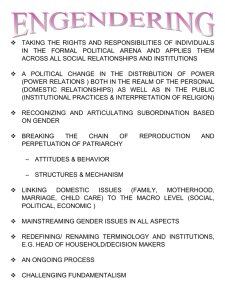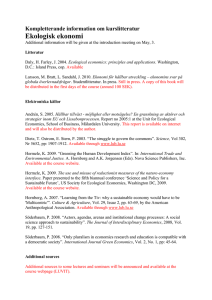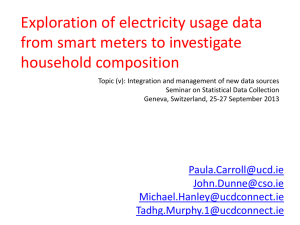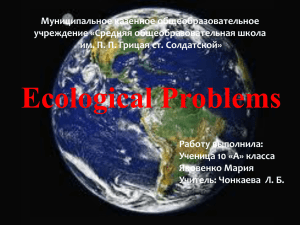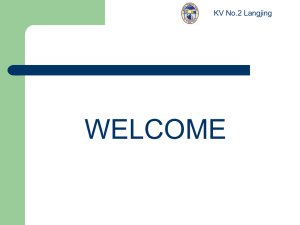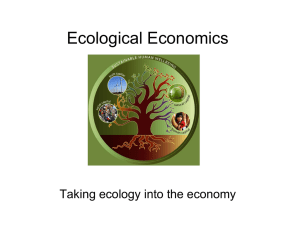EEWkbk-Intro3
advertisement
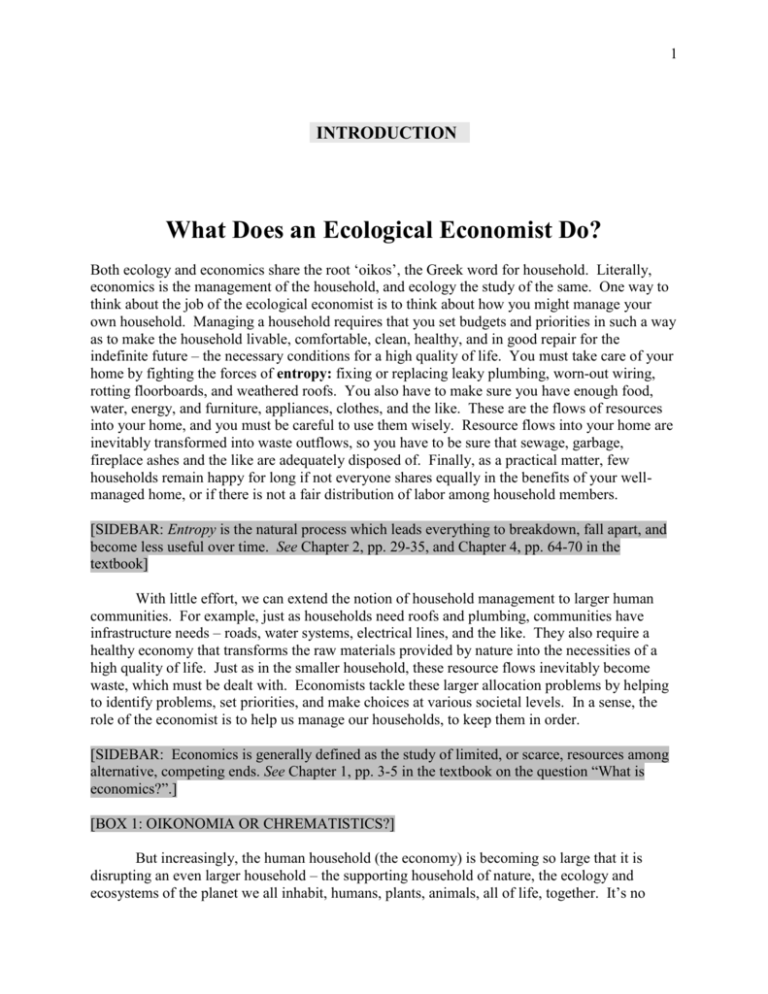
1 INTRODUCTION What Does an Ecological Economist Do? Both ecology and economics share the root ‘oikos’, the Greek word for household. Literally, economics is the management of the household, and ecology the study of the same. One way to think about the job of the ecological economist is to think about how you might manage your own household. Managing a household requires that you set budgets and priorities in such a way as to make the household livable, comfortable, clean, healthy, and in good repair for the indefinite future – the necessary conditions for a high quality of life. You must take care of your home by fighting the forces of entropy: fixing or replacing leaky plumbing, worn-out wiring, rotting floorboards, and weathered roofs. You also have to make sure you have enough food, water, energy, and furniture, appliances, clothes, and the like. These are the flows of resources into your home, and you must be careful to use them wisely. Resource flows into your home are inevitably transformed into waste outflows, so you have to be sure that sewage, garbage, fireplace ashes and the like are adequately disposed of. Finally, as a practical matter, few households remain happy for long if not everyone shares equally in the benefits of your wellmanaged home, or if there is not a fair distribution of labor among household members. [SIDEBAR: Entropy is the natural process which leads everything to breakdown, fall apart, and become less useful over time. See Chapter 2, pp. 29-35, and Chapter 4, pp. 64-70 in the textbook] With little effort, we can extend the notion of household management to larger human communities. For example, just as households need roofs and plumbing, communities have infrastructure needs – roads, water systems, electrical lines, and the like. They also require a healthy economy that transforms the raw materials provided by nature into the necessities of a high quality of life. Just as in the smaller household, these resource flows inevitably become waste, which must be dealt with. Economists tackle these larger allocation problems by helping to identify problems, set priorities, and make choices at various societal levels. In a sense, the role of the economist is to help us manage our households, to keep them in order. [SIDEBAR: Economics is generally defined as the study of limited, or scarce, resources among alternative, competing ends. See Chapter 1, pp. 3-5 in the textbook on the question “What is economics?”.] [BOX 1: OIKONOMIA OR CHREMATISTICS?] But increasingly, the human household (the economy) is becoming so large that it is disrupting an even larger household – the supporting household of nature, the ecology and ecosystems of the planet we all inhabit, humans, plants, animals, all of life, together. It’s no 2 longer sufficient to act just as manager of the human economy. The economist must now take into account (literally) the impacts of human activities on the planet’s living systems, and at the same time recognize the contributions that healthy living systems make to human well-being. This larger task requires detailed study of nature’s household as well as careful ethical reflection. Study reveals that nature’s household supplies us with all the resources required for our economy to function, and absorbs all of the waste our economy produces. In the human household, the manager combats the forces of entropy, repairing what nature and human activity wear out. But in nature’s household, human activity only speeds up the forces of entropy. A finite flow of solar energy maintains nature’s household in a state of repair (low entropy). If humans speed up the entropy process too much, the finite solar flow becomes inadequate, and the household falls into disrepair. Reflection leads us to recognize that we are one species among millions and one generation among many. Few people believe it is ethical to destroy or degrade what belongs to everyone for our own private gain. In a full world, the economist must integrate both ecology and ethics – become an ecological economist – to help manage nature’s household. [SIDEBAR: In an empty world, the economy is small relative to the containing environment. In a full world, the economy is relatively large, and the opportunity cost of continued growth is significant. See Ch. 2, pp. 16-18 in the textbook.] That’s a tall order. Can we realistically claim that ecological economists manage nature’s household, the global ecosystem that contains and sustains us all? The truth is that we do not know enough about the global ecosystem to manage it. In fact, because ecosystems are characterized by complexity and unpredictable evolutionary change, we can never know enough. At best, ecological economists strive to manage human impacts on nature’s household. In ancient Greece an economist (or oikonomos in Greek) was generally the caretaker of someone else’s house, and the word is thus frequently translated into English as “steward.” We might say that the ecological economist strives to manage the human households of family, community and society, while serving as a steward or caretaker of nature’s household based on the knowledge we obtain from the study of ecosystems. But what does it mean to be a steward of nature’s household? The steward's role is not that of creator – the steward is definitely a creature subject to the same laws of nature as all other species. Yet it would be silly to pretend that humans had no special power and consequent responsibility compared to other species. After all we do not blame deer for overgrazing, nor expect them to read this book! Rather than allocating resources towards maintaining nature’s household, a steward must make sure that resource allocation does not lead to the destruction of the household and the multiple services it provides. In the case of the Earth household, nature has provided us with a livable, comfortable, clean and healthy environment. But in today’s crowded, high consumption world, we are at risk of allocating too many natural resources towards the human household, and not enough towards the maintenance of nature’s household. The failure of traditional economists to recognize our pressing up against nature’s limits has resulted in a multitude of serious problems at the interface of human systems and the global ecosystem that sustains us. These problems are first and foremost complex, part of interconnected social and ecological systems where one twitch affects the next, and the next, and the next, potentially feeding back on the original twitch. In complex systems, the whole is greater than the sum of the 3 parts, processes are highly non-linear, and surprises are to be expected. Consider the problem of global climate change. Extensive study of the paleoclimate record suggests that we should not expect climate change to be smooth, gradual, and predictable. Past climate change has in general been characterized by surprises in the form of sudden, unexpected shifts between alternative patterns of atmosphere and ocean circulation, leading to rapid changes in regional and global climates.1 These problems also have very high stakes. If we make the wrong decisions with respect to global warming (or ozone depletion, or the production of persistent organic compounds, or deforestation, wetland loss, over-fishing, etc. ) we could cause untold suffering to future generations of humans. We could trigger a catastrophic extinction episode that would destabilize global ecosystems and dramatically degrade their ability to sustain human civilization. And these problems are urgent. It was with good fortune we realized what was happening to the ozone layer when we did. In fact, initial findings of the ozone hole over Antarctica were rejected as too implausible. However, the seriousness of the problem (even with imperfect information) forced countries to act, and to act quickly. We may not have much time to respond to climate change, species extinction, toxic waste emissions, ecosystem loss and other problems before changes become irreversible, and we are locked into an undesired path. So how should the human household respond to the coming era of climate change and other threats to our larger nature’s household? We have traditionally relied on objective scientists to gather the facts, perform their objective analysis, and tell us what to do. But with ecological economic problems, this is not so simple for at least two reasons. [BOX 2: COMPLEXITY (including Figure 2)] First, facts are uncertain and cannot be confirmed. There are a number of reasons for this in addition to the nature of complex systems. We cannot rely on experimentation or repeatable scientific observation. Many environmental problems have a sample size of one: a single unique ecosystem or, at the most extreme, a single planetary system. This is certainly the case with our global climate. We can make observations or perform experiments on a smaller scale, but complexity means that understanding things on one scale does not necessarily translate to understanding on a larger (or smaller) scale. Nor is it possible to make numerous observations of the same system over time. Global climate change is not a misnomer. The interconnected nature of the global ecosystem and global economy means that systems are in a constant state of change. In a continually co-evolving system, observations at different times are based on different conditions. Even when we have baseline data, which is relatively rare, we can’t be sure if it is relevant to current conditions. [SIDEBAR: Co-evolution describes a process of adaptation to changing circumstances between and within economic, social, and environmental systems. See Chapter 1, pp. 7-10 in textbook.] Even if experimentation were possible, tinkering with human systems or unique ecosystems presents serious ethical problems. As a result we can neither get sufficient observations for statistical analysis, nor can we use a scientific ‘control’. Even if ethical 1 Intergovernmental Panel on Climate Change (2001) Climate Change 2001: Impacts, Adaptation, and Vulnerability; Contribution of Working Group II to the Third Assessment Report of the Intergovernmental Panel on Climate Change, Cambridge University Press, Cambridge. 4 experimentation were possible, uncertainty and ignorance in complex systems is often irreducible – it is a property of the system itself, and not simply of incomplete knowledge or characterized by risk. We’re able to reconstruct recent climate change through temperature and precipitation records, and look back thousands of years by analyzing oxygen isotope ratios (an estimate of temperature) and greenhouse gas concentrations in air bubbles trapped in ice cores. However, we’ll never know with certainty what our future holds during our very first global experiment in releasing stored carbon over a few centuries that took millions of years to be deposited in fossil fuels. [SIDE BAR: Risk occurs when we know the outcomes, and can assign probabilities to their occurrence. Uncertainty occurs when we know the outcomes, but cannot assign meaningful probabilities to them. Ignorance, or absolute uncertainty, occurs when we do not even know the range of possible outcomes.] Second, objective facts are an inadequate basis for decisions. Values matter. What is our ethical responsibility to future generations and other species? How do we weigh uncertainty, especially when it affects future generations? How do we decide between different alternatives that have different sets of winners and losers? Should we reduce carbon emissions now at the cost of our economy’s health because it might save lives and increase the well-being of people not yet born? There are no objective answers to such questions. The task of the ecological economist is to solve problems in the face of complexity – without the ability to experiment and test, in systems where uncertainty and ignorance are the norm, when there are no ‘right’ answers, and the stakes are high and decisions urgent – and to shape the world into one that is environmentally sustainable, socially just, and economically efficient. Like the household manager, the ecological economist does not have all the requisite expertise. But he or she understands who does have that expertise, and how to help determine our priorities in its application. That is the particular work of the ecological economist, and learning how to do that work is the particular challenge of this workbook. [SIDE BAR: Sustainable scale, just distribution, and efficient allocation are the three main goals of ecological economics. See Ch. 1 in textbook for an overview] ■ WHY ECOLOGICAL ECONOMICS NOW? The world of today is different than the world of the last century, in which economics grew up. The biggest change is that human economic activity has grown to an unprecedented, global scale, with unprecedented global impacts. Humans now have the capacity to irreversibility alter the very systems that sustain us, but still lack the capacity to understand those systems. This is why stakes are high, decisions are urgent and values matter. This is why society requires a crucial change to the very means by which we understand the world around us – science. In the traditional view of scientific inquiry, science is seen as a value-free puzzle-solving exercise based on careful observations and repeatable experiments. Scientists try to understand nature through observation and measurement. As observations accumulate, the scientist develops a hypothesis that explains what has been observed, and uses the hypothesis to make predictions about what might occur. These hypotheses are then tested by experiments or further 5 observations. If the hypothesis is shown to be wrong (falsified) then the scientist develops another hypothesis that explains the discrepancies between observations and the previous hypothesis. When a hypothesis is found that consistently explains predictions, it becomes a theory, at least until new observations falsify the theory, and the process continues. This circular, trial-and-error approach constantly tests the degree to which theories presented explain reality. This approach has served us so well for so long that it has come to be accepted as “normal” science. However, as we described above, complex natural systems dominated by human activities pose significant challenges to normal science. Where scientists once believed they could study physical phenomena in isolation from human influence, they now must recognize the role of humans both in changing the physical environment and in determining what they study and how they study it. Moreover, science must recognize the role it has to play in societal decision making about complex problems. In response, a new approach to science has emerged. It has been labeled post-normal science 2 and suggests four important modifications to traditional science. First, post-normal science challenges us to extend our notion of who speaks with authority in the decision making process, including representatives beyond just scientists and credentialed experts. This approach emphasizes diverse values and expertise of stakeholders who may have intimate contact with a specific system, and observations and gut instincts not limited by disciplinary blinders. Scientific expertise can tell us how an air conditioning system works, and a professional repair person may be needed to fix it, but they are not the ones who should decide where to set the thermostat. Second, post-normal science also challenges us to ask what kind of information is acceptable for the decision making process. Acceptable information should reflect the expertise of the decision makers, as well as the uncertainty of scientific ‘facts’. Folk wisdom, local knowledge, anecdotal evidence, investigative journalism and small-scale surveys can have a place alongside expert opinion, scientific evidence, and peer-reviewed reports. [SIDE BAR: Peer review is a formal process by which experts within the author’s discipline judges the quality of their work. Extended peer review includes both credentialed and stakeholder expertise.] Third, post-normal science forces us to ask how much information is required to make a decision. Too often, on a sensitive issue, policy makers play it politically safe by asking science for more data before making a decision. The study of climate change won’t ameliorate its course. In a post-normal world, we see that we cannot wait for more studies. There are considerable costs to acquiring additional information, the most important of which is the possibility of irreversible changes that could occur while we are acquiring it, captured in Figure 1. 2 Funtowicz, S. and J. Ravetz (1993). The Emergence of Post-Normal Science. In: R. von Schomberg (ed.), Science, Politics and Morality. Scientific Uncertainty and Decision Making, Dordrecht: Kluwer, 85 – 123. 6 Figure 1 • Delaying a decision while we acquire more information is itself a decision. Forced to make decisions in the face of uncertainty and ignorance, we should rely on the precautionary principle. That is, we should avoid decisions that risk catastrophic and or irreversible outcomes, even when we perceive the risk of such outcomes to be low. Rather than trying to maximize probable net benefits, for example, it may instead be better to minimize maximum regrets. Forth, post-normal science rethinks how to assess the quality of a decision. The quality of research in complex ecological-economic systems simply cannot be judged solely on the basis of ‘hard’ scientific criteria such as replicability, analytical rigor, and peer review. Instead, its quality must be determined by an open debate among those interested in the outcome. Verdicts from such a group carry ‘moral force and hence political influence.’3 Thus, a post-normal lens to problem solving emphasizes the central role of stakeholders in decision-making, knowledge generation, and extended peer-review. The role of stakeholders, together with the complexity of problems in the realm of the ecological economist’s purview, further demands a transdisciplinary orientation to problem solving. As taught in many universities, traditional disciplines expose students to a set of tools they are expected to apply to any problem. If the disciplinary toolset is inappropriate for a particular problem, the researcher is expected to choose a different problem. 3 http://www.jvds.nl/pns/pns.htm 7 [SIDE BAR: Stakeholders are those who affect or are affected by the problem.] We do not typically have that luxury outside academia. In the university there are disciplines, but in the real world there are problems. Most of these problems are so complex that no single discipline is equipped to resolve them. Ecological economists must transcend artificial disciplinary and institutional boundaries. Again, as steward of the household, it’s not what you know, but who you know. Decision makers drawn from a broader pool are more likely to think ‘outside the box’, and come up with innovative solutions. And even if a traditional expert-based approach were to arrive at the same policy advice as an extended peer community, in the latter case the decision may be much easier to implement simply because stakeholders were an integral part of the process. Thus, ecological economics takes an alternative approach, in which there is no one specific set of methodologies. Instead, ecological economics defines a broad area of interest in which problems abound. The researcher selects a problem of interest, and this problem then determines the tools and disciplinary insights needed to resolve it. The necessary tools, methodologies, and insights for resolving the problem can be drawn from any discipline. “Multi” is many, “inter” is between, and “trans” is across. By incorporating knowledge across disciplines, very often the combination of tools and ideas lead to new tools and ideas, and transdisciplinary knowledge and understanding is born! The ecological economist strives to integrate transdisciplinary insights with human values, including but going well beyond traditional notions of economic value, into a decision making framework for solving problems in the real world. [SIDE BAR: As a transdiscipline, ecological economics draws on knowledge across disciplines.] ■ THE PROBLEM WITH LEARNING, AND PROBLEM-BASED LEARNING Transdisciplinary problem solving poses an interesting learning challenge. No one is likely to become proficient in all disciplines or incorporate all stakeholder perspectives. Yet we’re making the case that to solve problems requires knowledge across disciplines and broad participation from stakeholders. This requires no less than a new way of learning. The tradition through primary, secondary, and higher education has been a mold of specialized, disciplinary, sequential learning isolated from the messy world of uncertainty and dynamic change. Yet the challenges facing this century’s graduating classes are inherently multi-dimensional, cross-disciplinary, and interdependent. As an integral part of the sustaining and containing global ecosystem, the economic system cannot be understood in isolation from the Whole – we can’t erect neat disciplinary boundaries around this inherently complex field of study. Nor is it feasible to teach students how all the elements of the system work – a lifetime of education would not be enough. The most you can hope to learn is a process for problemsolving. But this is hard to figure out in the abstract. We at any rate cannot conceive of an effective way to teach transdisciplinary problem solving that doesn’t focus on real problems. Furthermore, traditional lecture based courses are simply not very efficient ways to learn. What do you recall from a class in which the instructor lectured and your performance was 8 evaluated on how well you could memorize and regurgitate each lecture? Does an accountant learn accounting in a classroom, or by doing it? Does a lawyer learn law in a classroom, or by doing it? A doctor? An engineer? A policy-maker? In fact, although each of us have PhDs in economics, none of the authors of this book actually learned economics in our undergraduate or graduate classes. We were ‘exposed’ to economics in class, but we truly learned and retained knowledge of economics when we first had to teach or apply economics. Ecological economists must learn through practice every bit as much as a musician or athlete. Why wait to learn until you get out of school? The more progressive medical, engineering, and business programs have long recognized the power of learning by doing, and have pioneered case-based learning. Ecological economics builds on the case-based tradition of education with some new twists. The term we prefer is problem-based learning. In many courses, professors design problems to study or pretend to work on in a case-based format – a time-consuming process with little to no benefit to those most affected by a problem. In ecological economics, we believe that there are enough real life problems that there is no need to spend time designing new ones. And these problems can use all the help they can get . . . as soon as possible. Even as students, you can play an important role in solving real problems. In your first attempts at problem solving, you may make mistakes. You may fail. But it is often just as important to know what fails as what succeeds, and of course to learn from our mistakes. We use numerous examples in this workbook of student projects that have played an important role toward solving a problem. In some of these examples, if the student group had not been there to work on the problem, it would have been too late to do anything. However, these examples are provided just to help get the creative juices flowing. You’ll get the most out of a problem-based learning approach to ecological economics if you are working on your own problem, and that is exactly what the rest of the workbook is designed to help you do! ■ PROBLEM SOLVING AND SYSTEMS THINKING This workbook is designed to help guide research, stimulate ideas, and share examples of transdisciplinary learning and decision making. Table 1 outlines the problem solving steps, focal questions, and project milestones along this journey, organized into the main tasks of building the problem base, analyzing the problem, synthesizing the findings, and communicating the results. Building the problem base includes choosing, defining, and structuring an ecological economic problem. Analysis is the breaking down of your problem into understandable components. Synthesis is the re-integration of the parts in a way that helps us better understand the whole. Communication is the translation of results into a form relevant to stakeholders, broadly defined as the extended peer community. [SIDE BAR: The problem solving process: 1. Build the Problem Base 2. Analysis 3. Synthesis 4. Communication] [TABLE 1 OVERVIEW OF THE PROBLEM-SOLVING PROCESS] 9 The workbook is similarly organized into these four parts, however, recognizing from the outset that problem-solving is rarely a linear, sequential process. If you follow these steps and find the process to be as easy as 1-2-3, then you’re either a truly gifted problem-solver, or you’ve only scratched the surface of your problem of study. Problem-solving isn’t easy. If it were, there wouldn’t be so many problems to solve! Most projects will visit, and re-visit, again and again the steps in the process. Most projects will find more dead-ends than open alleys. Most projects will be messy and at times frustrating. But if you stick with it, most projects will be both personally and socially rewarding. Given this fair warning, it’s essential to maintain a systems perspective throughout the problem-solving process. As we’ve started to describe, complex systems are, well, complex. They are loaded with positive and negative feedbacks. Understanding their intricate and evolving balance and how they contribute to properties of an underlying system of study brings us one step closer to knowing how, where, and when to intervene in a system. Analogous to holistic medicine, a healer doesn’t simply treat the symptoms of the disease but searches for a cure by evaluating the entire person – lifestyle, habits, diet, and so on. In ecological economics, simple technological fixes to problems (the equivalent of surgery in modern medicine) are rare. More often than not, if an effective technical solution to a problem exists, then the real problem is: why has that solution not been implemented? Often, closer inspection reveals that the technical fixes, like surgery, are often not real solutions in the first place. Heart surgery on an overweight smoker does not solve the underlying problem, nor do hydrogen powered ‘hypercars’ in a world where the number of cars and the miles driven per year exhibit exponential growth. [BOX 3: THE POST-NORMAL, SYSTEMS THINKER IN THE BRAZILIAN RAINFOREST] Solving problems is nothing more than making the appropriate interventions at the appropriate places, at the appropriate times. Donella Meadows, lead author of the well-known Limits to Growth report to the Club of Rome’s Project on the Predicament of Mankind,4 was one of the great systems thinkers of our age. Her life’s work on systems modeling and education lead to deep insight into leverage points – those places in a system where a small shift in one thing can lead to large changes in everything else. The vast majority of private and public policy attempts to leverage a system with what Meadow’s categorizes as the “numbers” – taxes, subsidies, and standards – yet this is typically the least effective place to intervene in a system and change its course.5 Each year’s local, state, or federal budget debate has become the dominant place to seek change in the system. But this is only playing with the numbers in a system that is plumbed the wrong way, or with antiquated rules, or long forgotten goals, or a failed mindset worshipped by unquestioning parishioners. Fixing the plumbing – the material stocks and flows, the positive and negative feedbacks, the information exchanged between system components – has higher leverage than playing with the numbers. Changing the rules (the incentives, punishments, and constraints) has higher leverage still. Changing the goals of the system still higher. And what Meadow’s finds as the most effective place to intervene in a 4 Meadows, Donella H., Meadows, Dennis L., Randers, Jørgen, and William W. Behrens III. 1972. The Limits to Growth. New York, NY: Universe Books. 5 Meadows, Donella. 1997. “Places to Intervene in a System,” Whole Earth, winter issue. 10 system is its mindset or paradigm – its pre-analytic vision – from which the goals, rules, and feedback structure arises. [SIDE BAR: The pre-analytic vision in ecological economics starts with an image of the economy with the containing and sustaining ecosystem. See Ch. 2 in the textbook.] A systems perspective, or systems thinking, is implicit throughout the textbook. When you begin to apply ecological economics to solving problems systems thinking must be front and center. Without actively, consciously, and conscientiously taking a systems perspective, you run the risk of adopting a ‘solution’ that causes other even bigger problems. Throughout the workbook, we are more explicit about the importance and uses of systems thinking to minimize this risk. It’s also essential to contact a sponsor – an individual or organization already working to solve a problem in which you are interested – early in the process. It’s very rare that a problem is solved during the course of a semester, or even an academic year. There are times however when real life decisions have to be made in a very short time, and a semester may be all the time available to gather, analyze, synthesize and communicate the information necessary to make a good decision. Whether you are contributing to a project that will continue long after you move on, or you are racing to complete your project before an imminent deadline, a sponsor brings continuity and accountability to your work. A sponsor might be a local institution from the not-for-profit sector, a government department, a local teacher or school, a for-profit business concerned with social or environmental issues, or your professor. Sponsors can save you an enormous amount of time in defining your problem, provide essential background materials, direct you towards the aspects of the problem where your project will be most useful, show you how to deliver your results in an appropriate format, and offer the continuity and structure to make sure your research is actually put to use. By following a problem solving process, maintaining a systems perspective, and working with a sponsor, your work can make a real contribution, however small, towards solving a problem that concerns you personally. Whatever you accomplish, no research you undertake will do any good unless you communicate your results to someone who can act on them. Without effective communication, your research is useless. Period. It’s been said, “We are drowning in information, yet starving for wisdom.” In analysis, academia has perhaps earned a grade of B+. There is little doubt that the ivory tower has generated volumes and volumes of information through analysis of the parts. In synthesis, we’re closer to a D. The sciences have just scratched the surface of synthesis, but the social sciences and humanities are woefully behind. But in communication, we deserve no better than an F. [SIDE BAR: The three keys to success in problem solving: communication, communication, and communication.] The biggest hurdle to effective communication of research to the general public has been an age-old hang-up called “objective distance”. Many academics excel at generating information, only to be presented to their peers or sit on library shelves in obscure journals, theses, and dissertations. Books are published and sold to these same libraries to be sourced and cited by other academics. Knowledge advances, but wisdom is evaded. Research at times 11 informs policy, but too often than not the researcher keeps their objective distance, assuring (even striving) not to get involved in advocating or implementing solutions. We take a different tact. A critical leverage point in problem solving is this objective distance, which can be shortened via effective and timely communication. Jane Lubchenco in her presidential address to the American Association for the Advancement of Science (a highly respected professional society for science) stressed the critical importance of communication from the scientific enterprise in the “century of the environment” in what she calls a “new social contract for science”: The new and unmet needs of society include more comprehensive information, understanding, and technologies for society to move toward a more sustainable biosphere – one which is ecologically sound, economically feasible, and socially just. New fundamental research, faster and more effective transmission of new and existing knowledge to policy- and decision-makers, and better communication of this knowledge to the public will all be required to meet this challenge.6 This is the challenge put forth to the ecological economist: to plot the course toward “a more sustainable biosphere” through transdisciplinary problem definition, analysis, synthesis and communication. Let’s get on with it! 6 Lubchenco, Jane. 1998. “Entering the Century of the Environment: A New Social Contract for Science,” Science 279: 491-497. 12 Table 1 • Overview of the Problem-Solving Process Problem Solving Step Focal Questions Project Milestone THE PROBLEM BASE Choosing a problem. What is an ecological economic problem? What are the desirable ends? Who is working on the problem? Generating a list of projects and groups of students. Defining the problem. What are the available means? What are the characteristics and state of knowledge of the scarce resources? Who receives the benefits and who receives the burdens? Contacting and contracting with a sponsor. Structuring the problem. What is the context of the problem? How did the problem become a problem? What are the decision alternatives to achieve desirable ends? Preliminary research, interviews, and literature review. ANALYSIS Breaking down the problem. What are the objectives of the problem-solver? What are the marginal benefits and costs of the objectives? What is the optimal scale as it relates to your problem? Problem statement. Evaluating the objectives. What knowledge and skills are needed to evaluate the objectives? Where and how can these knowledge and skills be found among stakeholder expertise? Where and how can these knowledge and skills be found among disciplinary expertise? Begin analysis based on inventory of stakeholder and disciplinary expertise. 13 SYNTHESIS Bringing it all together. Choosing a synthesis framework. How do the objectives influence one another? What are the key positive and negative feedback loops in the system? What ends get priority, and to what extent should resources be reallocated to achieve them? Examples: multi-criteria decision aides, systems dynamic modeling, integrating accounting, life-cycle synthesis, integrated assessment, others . . . Preliminary synthesis of goals, criteria, and decision alternatives. Choose and work within a synthesis framework. COMMUNICATION AND NEXT STEPS Communicating results. Changing the world. What are your communication goals, and who is the audience? How should you organize effective communication skills and techniques? Who should be involved in an extended peer review? How can your work help change the world? How can your project inform policy and management reform? How can you increase the odds your work is carried on? Final draft and extended peer review. Hand-off to sponsor. 14 BOX 1: Oikonomia or Chrematistics? The definition we provide of economics may be quite different from the popular understanding of the word. Most people, when they think of the work economists do, think of banking, stock markets and the accumulation of monetary wealth rather than the production and allocation of the real goods and services required to run a household—be it a household containing a nuclear family, or one containing the entire human population. In fact, the ancient Greeks clearly distinguished between two activities and two types of value we in the modern world lump together as economics. Oikonomia referred to the production and management of the physical commodities we actually use in our lives, objects that have what economists refer to as ´use value´. The desirable end in oikonomia is to acquire those things that contribute to the well being of household members. There is a finite limit to how much of anything we can actually use, so use value is bounded and finite. In contrast the manipulation of property and wealth to maximize short-term monetary exchange value was referred to as chrematistics. The accumulation of money becomes an end in itself in chrematistics. In fact, chrematistics is more closely related to the redistribution of real wealth than with its actual production. For example, during the 1990s in the United States, stock prices were rising at 15-20% per year, while the rate of increase in the production of real goods and services was in the range of 3-4% per year. When someone purchased an existing stock, he or she provided no new capital for production, and in fact contributed nothing to the production process. The physical output of the company represented by the stock might have been increasing at 5% per year while the owner of the stock saw a 20% return on investment through speculation on future earnings. Without actually producing anything himself, the owner of the stock was able to purchase a greater share of the output of others – those who actually did produce something. Such returns would certainly provide an incentive for the owner of a forest – a stock of capital that exhibited a natural but slow increase in real physical output – to cut it down and invest the profits in the rapidly growing stock market. But such speculative bubbles cannot continue forever, and when they finally burst, they often cause substantial unemployment of productive resources, thus diminishing real output. Those who foresaw the bursting bubble sold stocks short, and made a profit from the decrease in real output! 15 BOX 2: Complexity Complex means a lot more than complicated. Complex systems are characterized by positive and negative feedback loops, highly non-linear change, emergent phenomena, surprise, and chaotic behavior. What does this mean? Positive feedback loops increase the impact of some action. For example, global warming may thaw the arctic tundra, releasing methane, which is a powerful greenhouse gas. This will lead to more global warming, more thawing of the tundra, and more methane emissions: a positive feedback loop. Alternatively, increased atmospheric CO2 contributes to global warming, but a warmer average climate with high CO2 may accelerate plant growth, increasing the rate of CO2 sequestration in a negative feedback loop. Feedback loops lead to non-linear change: we should not expect a linear increase in atmospheric CO2 concentrations resulting from greater anthropogenic CO2 emissions, nor a linear increase in temperature owing to greater CO2 concentrations, nor linear change in the ecological and economics impacts of climate change. Figure 2 • Negative feedback loops Emergent phenomena are global behaviors that cannot be understood on the basis of the rules of the underlying interactions. For example, consciousness emerges from the interaction of neurons, but cannot be understood solely on the basis of the rules guiding the behavior of neurons. Many ecosystem functions are emergent phenomena, and human impacts on these 16 ecosystems may therefore cause unpredictable surprises. A related source of surprise is the fact that complex systems may hover around attractors, a more or less equilibrium state to which a system returns even after large shocks. However, a sufficiently large shock may send a system towards another attractor, which may be a dramatically different but similarly stable state. Finally, chaotic behaviors are those in which even infinitesimal variations in initial conditions lead to entirely different outcomes. Thus, an immeasurably small difference in initial conditions may lead a system to fall into one attractor basin rather than another as the result of human impacts. In contrast, it’s pretty easy to predict what will happen if we fail to repair a heater or air conditioner in our household. The basic point in such systems is that the whole is greater than the sum of the parts. When dramatic change will occur cannot be predicted, nor can the state into which a system will change. Evolution is a complex behavior, and ecological economic systems co-evolve. In such systems, cause and effect is neither deterministic nor linear. A reductionist, analytical approach of breaking a problem down into ever-smaller pieces alone will not help us to understand it. We must instead take a systems approach, described in more detail throughout the workbook. 17 BOX 3: The Post-Normal, Systems Thinker in the Brazilian Forest The call for a post-normal science has been answered to a large extent by the tradition of systems thinking. Similar to traditional science, systems thinkers break problems down into their component parts. However, more like post-normal science, a systems approach focuses on the interactions of these parts in an effort to achieve a greater understanding of how the whole functions. The systems thinker asks: Does a change in a system component lead to a change in other components? Do those changes feed back into additional changes in the first component? Do those feedbacks reinforce the first change (positive feedback), or dampen it (negative feedback)? For example, when dairy farmers in Brazil’s Atlantic Forest cut down trees, the moisture-laden water blowing in from the ocean no longer condenses on the now cleared forest, reducing the amount of water in the system. The canopy no longer forms an insulating layer that retains humidity and reduces temperature extremes. Flammable grasses grow where the forest once stood. The grasses burn, damaging and eventually destroying the remaining forests. Tree seeds cannot germinate on the dry soils in the dry air. Eventually, the forest may disappear altogether through a self-reinforcing, positive feedback loop. By focusing on the nature of feedback loops and understanding the other properties of complex systems, system thinkers take a holistic approach, complementing more reductionistic analysis.

